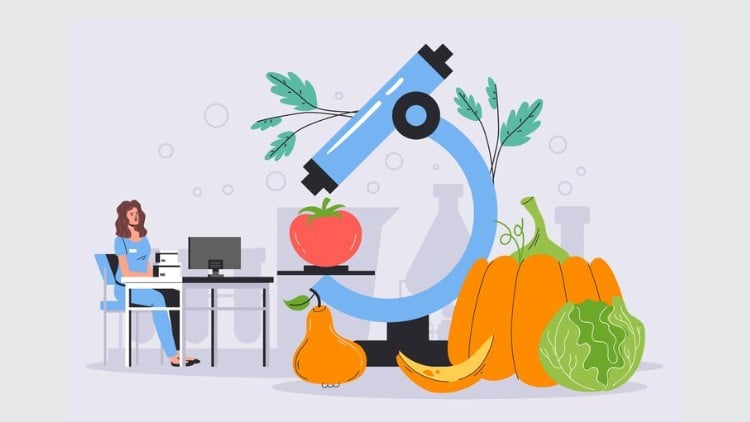
A Multidisciplinary Approach to Food Science
⏱️ Length: 1.5 total hours
⭐ 4.16/5 rating
👥 5,247 students
🔄 June 2023 update
Add-On Information:
Note➛ Make sure your 𝐔𝐝𝐞𝐦𝐲 cart has only this course you're going to enroll it now, Remove all other courses from the 𝐔𝐝𝐞𝐦𝐲 cart before Enrolling!
-
Course Overview
- This ‘Food Biochemistry’ course offers an essential journey into the molecular and chemical underpinnings that define the foods we eat, revealing the science behind their taste, texture, stability, and nutritional impact. It meticulously examines how the intricate interplay of proteins, carbohydrates, lipids, vitamins, and minerals shapes food from its raw state through consumption, elucidating phenomena from farm to fork.
- Explore the fascinating transformations food undergoes due to enzymatic activity, non-enzymatic reactions, and environmental factors like heat, light, and pH. Understand the biochemical rationale behind crucial processes such as ripening, fermentation, the Maillard reaction (responsible for browning and flavor), and rancidity development, which are fundamental to both traditional cooking and modern food manufacturing.
- Gain a comprehensive perspective on food as a complex, reactive system, where every component contributes to its shelf life, safety, sensory characteristics, and ultimately, its role in human health. This multidisciplinary approach equips learners to appreciate the scientific principles underpinning food innovation, preservation techniques, and the global food supply chain, fostering a deeper connection to what we eat.
-
Requirements / Prerequisites
- Curiosity and an Open Mind: An eager desire to understand the science within food and its impact on health, quality, and industry is the primary prerequisite for embarking on this enlightening course.
- Basic Scientific Comprehension: While no advanced academic background in science is mandated, a foundational familiarity with general biology and introductory chemistry concepts (e.g., basic molecular structures, chemical reactions, and biological processes) will significantly enhance your learning experience.
- No Specialized Equipment or Software: This course is designed to be accessible to a wide audience. All necessary learning materials are provided within the platform; therefore, no laboratory tools, advanced software, or prior scientific instrumentation experience is needed for this conceptually focused program.
-
Skills Covered / Tools Used
- Analytical Understanding of Food Functionality: Develop the capacity to analytically interpret the roles of various food components—such as emulsifiers, thickeners, stabilizers, and natural antioxidants—discerning their biochemical mechanisms in contributing to a food product’s desired texture, stability, and shelf life.
- Fundamentals of Food Spoilage and Preservation: Acquire a conceptual understanding of the principal biochemical pathways leading to food degradation, including enzymatic browning, lipid oxidation, and microbial growth, along with the scientific principles behind various preservation strategies designed to mitigate these processes effectively.
- Insights into Sensory Attribute Formation: Explore the biochemical origins of critical sensory qualities like flavor, aroma, and color, understanding how specific chemical reactions (e.g., Maillard reaction, caramelization) and the presence of volatile compounds contribute to the overall organoleptic profile and consumer acceptance of food.
- Conceptual Grasp of Biochemical Methodologies: While not hands-on, the course introduces the theoretical basis of key biochemical analytical techniques used in food science, such as chromatography for separating components and spectroscopy for identifying molecular structures, providing context for how food composition is scientifically determined.
- Informed Decision-Making in Ingredient Selection: Cultivate the ability to make more informed choices about ingredients, understanding how their inherent biochemical properties will interact during processing and storage to influence the final product’s quality, safety, nutritional value, and market appeal.
-
Benefits / Outcomes
- Elevated Food Literacy: Gain a profound, scientific understanding of food that transforms your perspective as a consumer, empowering you to critically evaluate food products, understand nutritional claims, and make healthier, more informed dietary and purchasing decisions for yourself and your family.
- Foundation for Professional Advancement: This course provides a robust biochemical cornerstone for individuals pursuing or already engaged in careers within the food industry, including roles in research and development, quality assurance, product innovation, culinary arts, and even food marketing, thereby enhancing professional credibility.
- Enhanced Culinary and Product Development Creativity: For aspiring chefs, food technologists, or home cooks, the course illuminates the scientific ‘why’ behind successful cooking techniques and ingredient combinations, fostering an innovative mindset for creating new recipes and improving existing food products.
- Contribution to Food Safety and Sustainability: Develop a clearer understanding of how biochemical principles are applied to ensure food safety, prevent spoilage, and reduce food waste, thereby contributing to more sustainable food systems and public health initiatives on a broader scale.
- Critical Assessment of Food Information: Equip yourself with the scientific knowledge to discern fact from fiction regarding popular food trends, dietary advice, and ingredient debates, enabling you to navigate the complex world of food information with greater confidence and evidence-based reasoning.
-
PROS
- Efficient and Impactful Learning: Despite its concise duration, the course is expertly designed to deliver a high-yield understanding of fundamental food biochemistry, providing maximum impact for minimal time investment, ideal for busy individuals.
- Versatile Applicability: The core biochemical principles discussed are broadly applicable across various sectors—from personal health and home cooking to professional roles in the food industry—making it a valuable asset for a diverse audience with differing objectives.
- Strong Foundational Insights: Offers a solid and engaging introduction to complex biochemical concepts, serving as an excellent springboard for those considering deeper dives into food science, nutrition, or related scientific disciplines without being overwhelming.
-
CONS
- Limited Depth for Advanced Topics: Due to the exceptionally short duration (1.5 hours), comprehensive exploration of highly specialized biochemical reactions or advanced analytical techniques is necessarily limited to an overview.
Learning Tracks: English,Teaching & Academics,Science
Found It Free? Share It Fast!